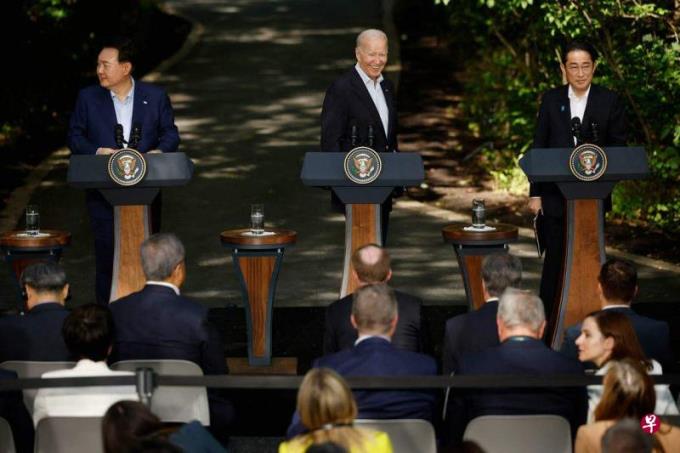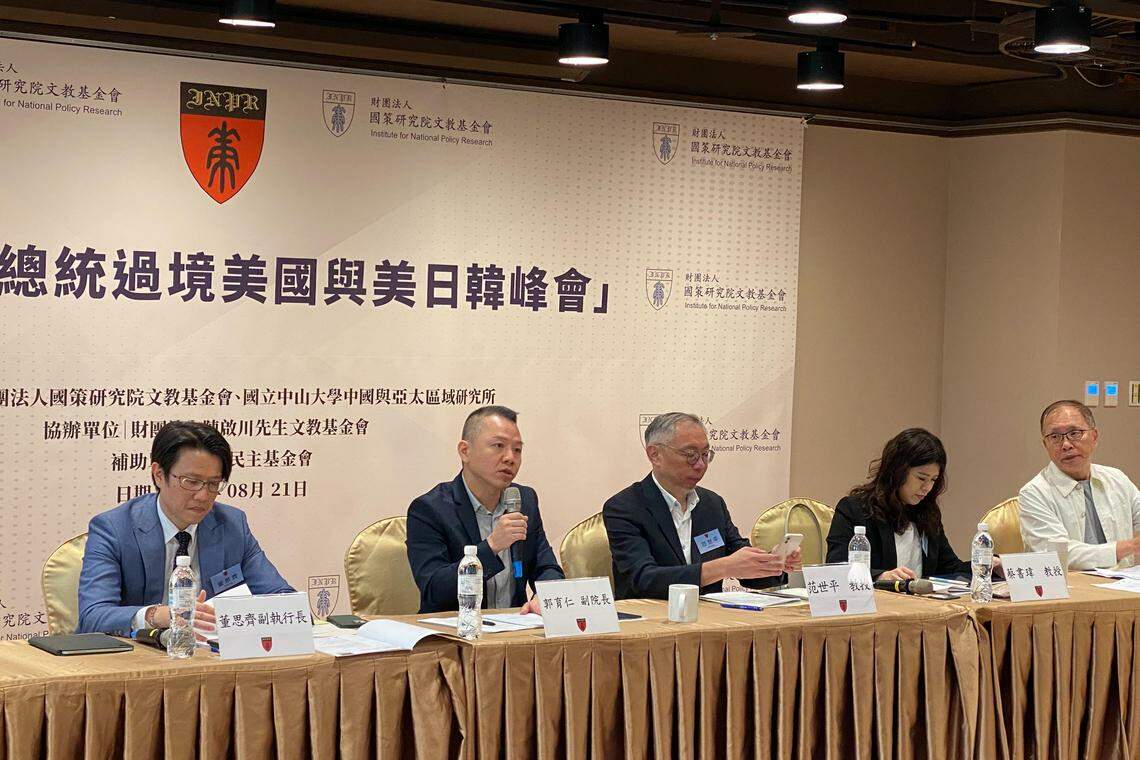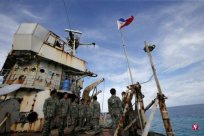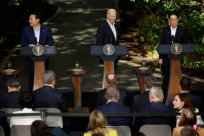
Taiwan scholars 'analysis believes that this time the US -Japan -South Korea leaders' summit will concern the security of the Taiwan Strait, increase pressure on Beijing, and institutionalize cooperation. It may ensure that Beijing can provide a faster collective response when it is committed to Taiwan.However, the United States, Japan, and South Korea have different considerations on the expansion of China and how to respond to China's expansion, and also test the actual results of the three parties cooperation.
U.S. President Biden, Japanese Prime Minister Kishita, and South Korean President Yin Xiyue held a summit at the David Camp in the United States last Friday (August 18) to pay attention to topics such as the Russian and Urotic War, the Taiwan Strait and the South China Sea, and the threat of the North Korean nuclear weapons.In the joint statement, it strongly condemned China's "danger and aggression" in the South China Sea, and further increased pressure on China.
TheSummit also announced that the establishment of a three -side working group in response to the North Korean nuclear threats and regular three -party military exercises in multiple fields.The United States, Japan and South Korea will also continue to cooperate in the fields of economic security and technology, ensuring the security of the supply chain toughness, and new hotline for shared information.At the same time, it is planned to hold the Three Kingdoms Leadership Meeting in the future.
Dong Siqi, deputy chief executive of Taiwan think tank on Monday (August 21), pointed out when attending the Symposium held by the National Policy Research Institute in Taipei that when the United States, Japan and South Korea met at the Phnom Penh in Cambodia last November, they announced the establishment of an economic security dialogue mechanism, and then they would and then they would be.It has been interpreted as the willingness to cooperate to curb China in the field of economic security and military, and this summit further implements institutional cooperation.
Dong Siqi pointed out that in the past, Japan and South Korea's political contradictions were regarded as a breakthrough in China ’s relationship with the United States, Japan and South Korea’ s alliances; after South Korean President Yin Xiyue took office, due to the sharp upgrade of the North Korean nuclear missile crisis, he decided to strengthen the promotion of South Korea -American and Japan ’s security cooperation.The "head of the head of state" under the normalization of South Korea and Japan has allowed the three -party cooperation mechanism of the United States, Japan and South Korea to gain an institutional opportunity.
He also believes that this summit is the first step in the development of the new and three -sided relationship between the United States, Japan, and South Korea, and the United States has also been able to strengthen the most important strategic gap in the Indo -Pacific region.
 />
/>
Fan Shiping, a professor at the Institute of Political Science, Taiwan Normal University, mentioned that the summit will gradually take shape of "Indo -Pacific NATO", especially under the mediation of Biden, Japan and South Korea can donate the common prejudice of historical prejudices.Cooperation is really valuable.He believes that in the future, if it is combined with India, Australia and New Zealand, the overall defense force will be formed.
In addition, after the US -Japan -South Korea leader summit this time, it also jointly published three documents including the spirit of David Camp, the principles of David Camp and the negotiation commitment.The document mentioned that the peace and stability of the Taiwan Strait as an indispensable element of the security and prosperity of the international community, and called for peace to solve the problem of cross -strait problems.
The leaders of the Three Kingdoms also promised that the three -sided communication channels will be quickly carried out in order to quickly coordinate and respond together when emergency problems occur.
Dong Siqi said that from the above three documents, the United States, Japan and South Korea are strengthening the mechanism and strength of China in East Asia, and the peace of Taiwan is also regarded as one of the focus.
He believes that the strengthening US, Japan and South Korea cooperation mechanism may ensure that if there is an invasion in Beijing in the future, the three parties can provide a faster collective response.
But Dong Siqi mentioned that the current US -Japan -South Korea leaders are looking forward to a three -party cooperation mechanism that will not change due to the rotation of the domestic regime.
He pointed out that South Korea still has a lot of resistance to the historical issues of South Korea and Japan's nuclear wastewater.In addition, the government of Yin Xiyue, who is facing the Dae -wanda University in Congress, cannot lead the ruling party to win in the Congress elections in April next year. The follow -up will inevitably affect the results and expected effects of the US -Japan -South Korea Summit.
Cai Shuwei, assistant professor of the Asia -Pacific Institute of Sun Yat -sen University in Taiwan, also believes that the United States, Japan and South Korea have a relatively high consensus on the North Korean issue, but there are different considerations on Indo -Pacific cooperation and how to respond to China's expansion.In the long run, the summit is really institutionalized and promoted to a formal three -sided alliance cooperation relationship. It still needs to be continuously observed.



